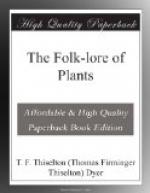“The sensitive plant was the earliest,
Up-gathered into the bosom of rest;
A sweet child weary of its delight,
The feeblest and yet the favourite,
Cradled within the embrace of night.”
Who can wonder, on gazing at one of these wonderful plants, that primitive and uncultured tribes should have regarded such mysterious and inexplicable movements as indications of a distinct personal life. Hence, as Darwin in his “Movements of Plants” remarks: “why a touch, slight pressure, or any other irritant, such as electricity, heat, or the absorption of animal matter, should modify the turgescence of the affected cells in such a manner as to cause movement, we do not know. But a touch acts in this manner so often, and on such widely distinct plants, that the tendency seems to be a very general one; and, if beneficial, it might be increased to any extent.” If, therefore, one of the most eminent of recent scientific botanists confessed his inability to explain this strange peculiarity, we may excuse the savage if he regard it as another proof of a distinct personality in plant life. Thus, some years ago, a correspondent of the Botanical Register, describing the toad orchis (Megaclinium bufo), amusingly spoke as follows of its eccentric movements: “Let the reader imagine a green snake to be pressed flat like a dried flower, and then to have a road of toads, or some such speckled reptiles, drawn up along the middle in single file, their backs set up, their forelegs sprawling right and left, and their mouths wide open, with a large purple tongue wagging about convulsively, and a pretty considerable approach will be gained to an idea of this plant, which, if Pythagoras had but known of it, would have rendered all arguments about the transmigration of souls superfluous.” But, apart from the vein of jocularity running through these remarks, such striking vegetable phenomena are scientifically as great a puzzle to the botanist as their movements are to the savage, the latter regarding them as the outward visible expression of a real inward personal existence.
But, to quote another kind of sympathy between human beings and certain plants, the Cingalese have a notion that the cocoa-nut plant withers away when beyond the reach of a human voice, and that the vervain and borage will only thrive near man’s dwellings. Once more, the South Sea Islanders affirm that the scent is the spirit of a flower, and that the dead may be sustained by their fragrance, they cover their newly-made graves with many a sweet smelling blossom.
Footnotes:
1. See Tylor’s “Primitive Culture,”
1873, i. 474-5; also Dorman’s
“Primitive Superstitions,”
1881, p. 294.
2. “Primitive Culture,” i. 476-7.
3. Jones’s “Ojibways,” p. 104.
4. Marsden’s “History of Sumatra,” p. 301.
5. Mariner’s “Tonga Islands,” ii. 137.




